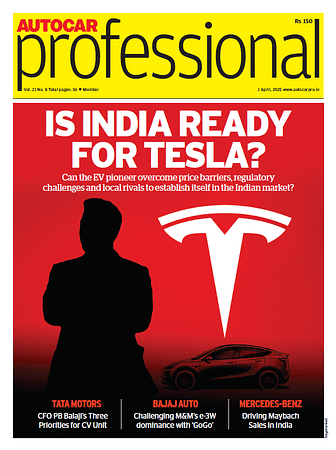Aston Martin boss: cost of autonomy will force mass car firm mergers
Andy Palmer predicts major industry consolidation due to heavy spending required to develop new technology.
The investment needed to develop connected and autonomous vehicles will likely lead to mass consolidation of car companies globally, according to Aston Martin boss Dr Andy Palmer. However, he also believes that the six globally recognised luxury car makers today - including Aston and with Lagonda set to join in 2022 when it launches an electric SUV - will thrive despite the challenges.
Speaking at the Society of Motor Manufacturers and Traders’ (SMMT) Connected conference, Dr Palmer said he believes many existing brands will have to form alliances, merge with or sell to rivals in order to survive.
“We’re all developing similar technology costing billions and that’s nonsense,” said Dr Palmer. “I think it is inevitable car companies will come together through mergers and acquisitions. The requirements will be too much for many of the firms involved. The business model of spending $1bn to develop a car and then have to pile it high and sell it cheap - discounting - in order to keep factories turning and maintain economies of scale is broken.”
Today, most analysts put 14 conglomerates - of around 200 car companies globally, selling approaching 100m cars between them this year - at the heart of the global industry: Ford, PSA Group, Tata, Daimler, VW Group, Honda, Toyota, GM, BMW, Nissan, FCA Group, Geely, Renault and Hyundai. However, the rise of Chinese brands that are beginning to take significant sales in their home market - the largest for car sales in the world - is set to disrupt that dynamic.
“Yes, enlightened mega-companies like Toyota can develop technology alone and survive, but I feel many more companies will fall under the wing of such firms to the point that we have just two or three mega-companies dominating, in the way Boeing and Airbus do in the airline industry,” said Dr Palmer.
“Along the way I’m sure we’ll see newcomers, some who will succeed, some who will be bought and some who will fail. But the inevitablity is that there will be mergers and acquisitions.”
Mercedes-Benz and BMW are already collaborating on autonomous technology, while firms such as the VW Group and Toyota are seeking partners to share their electrified technology with. Palmer concedes that Aston Martin and Lagonda would have to forge partnerships to supplement its own advances in the new technologies, but added that the firm's small size, relative agility and ultra-luxury status offered a bright future.
"The six luxury car makers - us, Ferrari, Bentley et al - represent just 3 percent of global car brands and 0.06 percent of all global sales, but being globally recognised as a luxury brand is an accolade that is hard to obtain and even harder to retain," said Dr Palmer. "If something becomes easy to access or create it becomes a commodity, and for mainstream car makers that is a very real risk, but for car companies that don't have to sell one more car to help a parent firm's bottom line, there are opportunities. Independent, luxury car makers like us can thrive by fighting against commoditisation and focusing on adding to our mythology.
"My prediction is that in ten years time there will be no new players in the luxury sector. With Lagonda, there will be just seven of us. But, conversely, I wonder if one of the luxury makers might be forced down into the premium sector just to add that one more sale to the bottom line."
Palmer also hit out at car companies and legislators that he feels are seeking to gain a publicity advantage by fast-tracking the development of autonomous technology onto cars driven by the public too soon. He did not specify which brands he was referring to, although he did highlight the recent announcement from EU legislators to fit certain safety equipment, including speed limiters, as standard from 2022, as well as highlighting the shortcomings of the current 3G, 4G and 5G networks.
“Car companies have a moral obligation to do their best to strive for zero fatalities,” he said. “My argument is that must be done in a logical way which takes note of the fact that by far the biggest reason for accidents is driver distraction and error. We have to be careful that we don’t rush technology that adds to those issues.
“If we legislate around populist policies without thinking, then customers could end up being used in beta testing on public roads. In my mind, any company launching level-three autonomous vehicles [where a human has to be ready to take back control of the vehicle] is reckless. That is why we – and others – will move straight from level two to four. Those that don’t, risk being reckless.
"The recent European regulations around speed control risk more accidents by causing more distraction around speed controls. I understand geo-fencing areas around schools and hospitals, for instance, and enforcing lower speed limits there, but when the technology isn't there to support the ambition then blindly applying something because it gets soundbites and votes is wrong.”
Recommended reading: Dr Andy Palmer writes for Autocar Professional on 'The Evolution of the Luxury Business'
RELATED ARTICLES
Aisin to produce hybrid motor for Mitsubishi in Thailand
The hybrid drive motor and gearbox, will be produced at Aisin Powertrain (Thailand) Co for use in the Mitsubishi XForce ...
GM reports strong Q1 sales in China, demand for EVs and hybrids surges 53%
General Motors and its joint ventures in China have sold more than 442,000 units between January and March 2025.
Volkswagen to invest $580 million in Argentina, plots new pick-up truck for South America
Volkswagen is paving the way for the next generation of mid-size pick-up truck as a successor to the Amarok. The new mod...






 05 Apr 2019
05 Apr 2019
 9901 Views
9901 Views





 Autocar Professional Bureau
Autocar Professional Bureau




